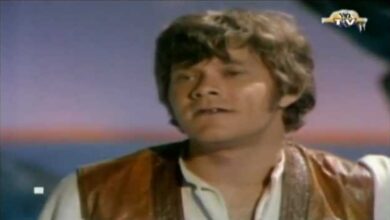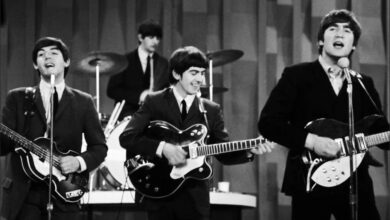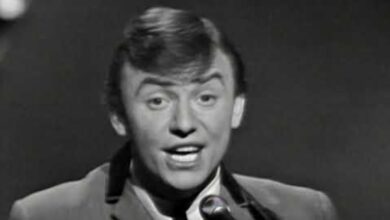This is the song that, according to Priscilla, Elvis pours all his heart out in its performance
Elvis Presley’s performance of “If I Can Dream” during his ’68 Comeback Special is one of the most iconic moments in his illustrious career. This song, imbued with deep social and political resonance, stands out not only for its powerful lyrics and moving melody but also for the context in which it was presented to the world.
The ’68 Comeback Special, formally titled “Singer Presents…ELVIS,” marked a pivotal turning point in Elvis’s career. The special aired on NBC on December 3, 1968, and was the result of careful planning and strategic direction by producer Steve Binder. Initially conceived as a Christmas special, Binder steered the program away from holiday themes towards a more intimate, raw showcase of Elvis’s talents. This decision came at a crucial time when Elvis’s career was experiencing a lull, primarily due to a series of formulaic films and their corresponding soundtracks, which had not resonated well with fans or critics.
Elvis’s career in the 1960s had been dominated by these films, and while they were commercially successful, they did little to highlight his true musical abilities. The ’68 Comeback Special provided a platform to reconnect with his audience and remind the world of his dynamic stage presence and unparalleled vocal prowess. The special was set in a unique format, featuring segments with a small live audience, intimate performances, and larger production numbers.
“If I Can Dream” was written by songwriter W. Earl Brown, inspired by the assassination of Dr. Martin Luther King Jr. and Senator Robert F. Kennedy earlier that year. The song’s lyrics reflect Elvis’s deep-seated hopes for a better world and were a poignant response to the social upheaval and racial tensions of the time. The lyrics, “If I can dream of a better land, where all my brothers walk hand in hand,” captured the collective longing for peace and equality, resonating deeply with audiences.
During the recording of the song, Elvis’s emotional connection to the lyrics was palpable. His powerful delivery conveyed not just his vocal ability but also his personal convictions. The performance of “If I Can Dream” closed the special, leaving a lasting impact on viewers and solidifying the song’s place in Elvis’s repertoire as a symbol of hope and aspiration.
In the years following the ’68 Comeback Special, “If I Can Dream” was included in various compilations of Elvis’s work, particularly those focusing on his inspirational songs. The song’s enduring appeal has led to multiple remasterings and re-releases, ensuring that it remains accessible to new generations of listeners.
The song has been covered by numerous artists, each bringing their unique style to the powerful anthem. Barry Manilow, known for his emotive performances, delivered a heartfelt rendition that stayed true to the original’s spirit. Michael Ball, a prominent figure in musical theatre, also offered a stirring version, highlighting the song’s dramatic qualities. In a more contemporary twist, the Italian rock band Måneskin performed “If I Can Dream” during the Eurovision Song Contest 2022, infusing it with their distinct energy and style. This version was later included in the soundtrack of the biographical film “Elvis,” directed by Baz Luhrmann, which further introduced the song to a broader audience.
The ’68 Comeback Special itself has been the subject of numerous retrospectives and analyses, often cited as a high point in Elvis’s career. The special not only revitalized his career but also set the stage for his return to live performances, including his legendary Las Vegas residencies. The success of the special underscored Elvis’s enduring appeal and his ability to adapt to the changing musical landscape.
The album “If I Can Dream: Elvis Presley with the Royal Philharmonic Orchestra,” released in 2015, took Elvis’s iconic vocals and paired them with new orchestral arrangements by the Royal Philharmonic Orchestra. This project was an ambitious endeavor to reimagine some of Elvis’s greatest hits with a lush, classical backdrop. The album includes a selection of his well-known tracks such as “Burning Love,” “It’s Now or Never,” and “Can’t Help Falling in Love,” each given a new dimension through the orchestral arrangements.
The album was met with commercial success, entering the Billboard Classical Chart and achieving notable sales and chart positions worldwide. It was praised for its innovative approach to preserving and celebrating Elvis’s legacy while introducing his music to classical audiences. The collaboration with the Royal Philharmonic Orchestra highlighted the timeless quality of Elvis’s voice, demonstrating its versatility across different musical genres.
Elvis Presley’s influence on music and culture is profound and far-reaching. Born on January 8, 1935, in Tupelo, Mississippi, he rose from humble beginnings to become one of the most celebrated and influential figures in popular music. His unique blend of rock and roll, rhythm and blues, and country music created a sound that was distinctly his own, earning him the title of “The King of Rock and Roll.”
Elvis’s early career was marked by a string of groundbreaking hits, including “Heartbreak Hotel,” “Hound Dog,” “Don’t Be Cruel,” and “Jailhouse Rock.” His dynamic performances, characterized by his charismatic stage presence and distinctive vocal style, captivated audiences and set the standard for rock and roll artists. His appearance on “The Ed Sullivan Show” in 1956, where he was famously shown from the waist up due to his suggestive dance moves, cemented his status as a cultural icon.
Despite his immense success, Elvis’s career faced challenges, particularly during the mid-1960s. His focus on film projects led to a series of formulaic movies that, while commercially viable, did not showcase his true musical talent. The ’68 Comeback Special was a crucial moment of reinvention, allowing Elvis to reclaim his place as a leading figure in music.
The social and political context of the late 1960s played a significant role in the development of the ’68 Comeback Special. The assassinations of Dr. Martin Luther King Jr. and Senator Robert F. Kennedy had a profound impact on the nation, and Elvis was no exception. These events, coupled with the broader civil rights movement and growing disillusionment with the Vietnam War, created a backdrop of unrest and a yearning for change.
Elvis’s decision to perform “If I Can Dream” was a reflection of his desire to contribute positively to this turbulent period. The song’s message of hope and unity resonated with the broader societal desire for progress and reconciliation. Elvis’s performance was not just a musical moment but a statement of solidarity with those advocating for social justice and peace.
Throughout his career, Elvis continued to evolve as an artist. His live performances in Las Vegas during the early 1970s showcased a more mature, polished entertainer, capable of commanding the stage with a blend of his early rock and roll energy and a newfound sophistication. These shows were characterized by elaborate costumes, larger-than-life stage productions, and a repertoire that included both his classic hits and contemporary favorites.
Despite personal struggles, including health issues and the pressures of fame, Elvis remained a beloved figure until his untimely death on August 16, 1977. His passing marked the end of an era, but his legacy continues to thrive. Elvis’s music, style, and persona have influenced countless artists across multiple genres, and his impact on popular culture remains indelible.
The posthumous recognition of Elvis’s work, through projects like “If I Can Dream: Elvis Presley with the Royal Philharmonic Orchestra,” underscores the enduring appeal of his music. These projects not only celebrate his contributions to music but also introduce his work to new audiences, ensuring that his legacy continues to inspire and entertain.
In the decades since his death, Elvis has been the subject of numerous biographical films, documentaries, and tribute performances. Each of these projects has sought to capture the essence of what made Elvis a unique and transformative figure in music. The 2022 biographical film “Elvis,” directed by Baz Luhrmann, is one such example. The film, which includes Måneskin’s cover of “If I Can Dream,” explores the complexities of Elvis’s life and career, highlighting his influence on music and culture.
Elvis Presley’s journey from a small-town boy in Tupelo to an international superstar is a testament to his talent, charisma, and enduring appeal. His ability to connect with audiences, regardless of the era, speaks to the timeless quality of his music and his unique place in the pantheon of musical legends.
The legacy of “If I Can Dream” is a reflection of Elvis’s broader impact on music and culture. The song’s message of hope, unity, and aspiration continues to resonate with listeners, serving as a reminder of the power of music to inspire and bring about change. As new generations discover Elvis’s music, the enduring appeal of his work ensures that his legacy will continue to shine brightly for years to come.
The ’68 Comeback Special remains a landmark moment in Elvis’s career, symbolizing both his artistic resurgence and his enduring connection with audiences. “If I Can Dream” stands as a testament to his ability to transcend the challenges of his time and deliver a message of hope and unity that continues to resonate today.



